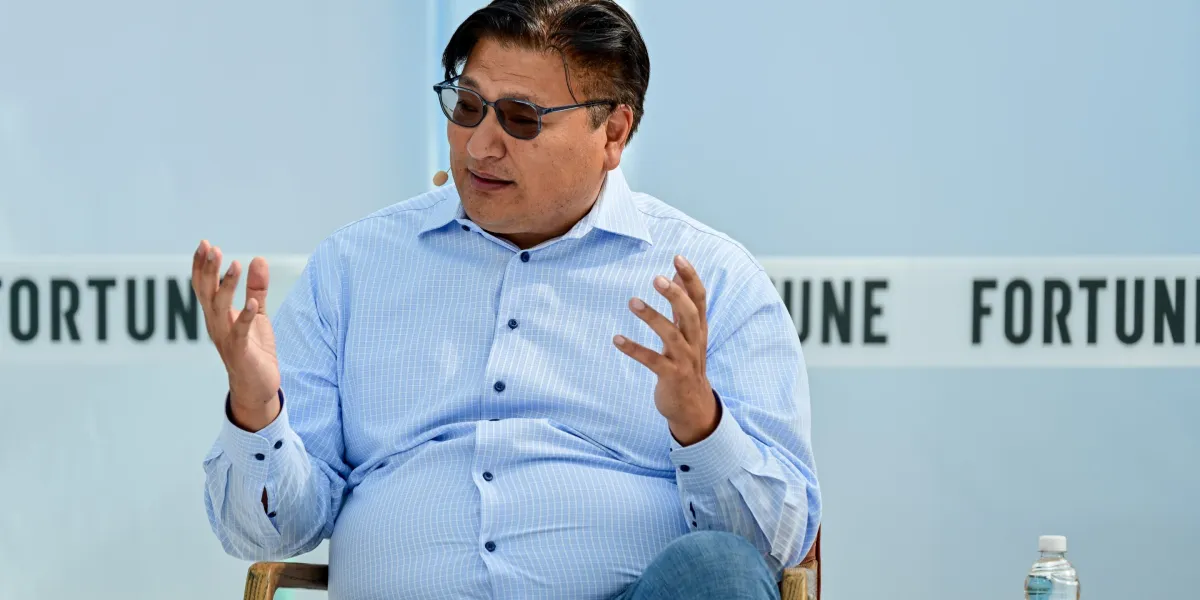
The Trump administration is tightening visa policies, leading to delays for those trying to enter the U.S. And moves like the White House’s campaign against leading universities may be discouraging international students from pursuing education in the U.S.
While Silicon Valley itself will always “remain very pro-immigrant,” the broader political changes within the U.S. could create opportunities for other regions, said Hans Tung, managing partner of U.S.-based venture capital firm Notable Capital, at the Fortune Brainstorm Tech conference in Park City, Utah last week.
“When I look at Europe, this is a perfect time to be a lot more open, to include a lot more STEM students from around the world to go to Europe, to innovate on AI in Europe,” Tung said. “Wherever is more open still has a chance to win the next cycle.”
Wendy Tan White, CEO of Intrinsic, a robotics firm owned by Alphabet, pointed out a lack of local talent is constraining U.S. ambitions to revive domestic manufacturing. “That has to be replaced in some way,” she explained. “I think the only way to do it now is through intelligent automation, especially if you want to bring that reshoring of manufacturing back to the U.S.,” White said.
Manufacturing talent has been spotlighted in recent weeks after Immigration and Customs Enforcement raided an LG-Hyundai factory in Georgia earlier this month, detaining several hundred Korean workers. The raid sparked outrage across the South Korean political spectrum, with some Korean businesses reportedly pausing their U.S. investment projects in response.
On Sunday, Trump said he didn’t want to “frighten off” investors, and admitted that the U.S. needed foreign experts to build up industries like chips.
Can the U.S. keep its lead?
The U.S. has long dominated the global tech sector, combining the world’s largest tech companies, deep capital markets, and leading universities. That strength has led to a slightly snarky maxim: “The U.S. innovates, China iterates, Europe regulates.”
Still, recent innovations elsewhere from non-U.S., and particularly Chinese, tech companies are challenging that narrative. Asian companies had already taken the lead in advanced manufacturing, particularly in goods like semiconductors and industrial robotics. More recently, Chinese tech firms like DeepSeek and Alibaba are also pushing the boundaries on AI development, releasing open-source models that have pushed U.S. developers like OpenAI and xAI to respond in kind.
“It’s changed. With the open-sourcing of things like DeepSeek, China is starting to drive some of that innovation, and is open to driving that,” White said, pointing to robotics as an example.
Maeve Reiss for Fortune
China is focusing on what experts call “embodied AI,” or real-world applications of AI models. China produces nearly half the world’s industrial robots, giving the country a possible synergy between hardware and software.
“There’s a huge manufacturing knowledge and expertise in China, as there is in Germany. And so we have teams that try to learn from that,” White explained. And she saw an opportunity in combining the industrial strength in markets like Germany and China “with the software engineering and AI expertise we have from the Valley,” she suggested.
White noted that investors “can’t ignore the U.S,” adding that “the AI development going on there is still outstripping what’s going on globally.” Still, when it comes to specific applications, “there’s not going to be one pure winner,” she said.
“That’s where the competition is going to come.”
Going global
Speakers at Brainstorm Tech pointed out there’s opportunities beyond the U.S. and China. Some smaller countries, like Singapore and the UAE, are also trying to become leaders in AI, leveraging their global connections, attractiveness to global talent, and deep pockets.
“When it comes to software, there’s no question that Silicon Valley still leads innovation in many ways,” Tung said. “But Silicon Valley is not the only game in town, and you see different countries be good at different things.”
Founders outside the U.S. are “just naturally more in tune to what’s needed beyond the U.S., and therefore think about building applications and solutions that cater to the non-English population,” he added.
Maeve Reiss for Fortune
“Any company, small or large, has to really think global on day one, figure out ways to leverage the capabilities where they can find them and access them, and that’s everything from talent to being in a business-friendly environment,” Chan Ih-Ming, an executive vice president of the Singapore Economic Development Board, said last week. (The EDB is a partner of Fortune Brainstorm Tech).
“It’s a global world. The important thing is to look further afield, right?” he added later. “We are already pretty interconnected. Moving too far in the opposite direction would be a problem.”



